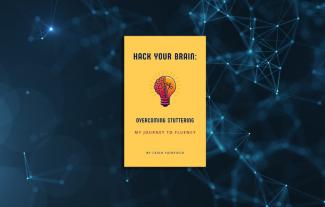Book review: Hack your brain

STAMMA volunteer Colin Gould shares his thoughts on the book Hack your brain: overcoming stuttering — my journey to fluency by Leigh Fairfield.
Overall, despite the title — more about that later — I really liked this short self-help book aimed at readers who are frustrated with their stammer and looking for more control. In it, the author, Leigh Fairfield, shares her method of, as she says, 'reprogramming the brain' to transform how we think about stammering.
Fairfield begins by explaining what stammering is, with some statistics and a list of famous people who stammer thrown in. This is followed by a strong, honest exploration of what it feels like to live with a stammer, and Fairfield does a great job of describing the experience and the different ways she tried to mask her covert stammer. I related to this deeply — as someone who has used techniques like hiding my mouth or looking away, I loved seeing that level of depth and recognition.
Her personal story is honest, relatable and gives readers a sense of not being so alone. Stammering can feel incredibly isolating, especially if you don't know any others going through the same experience. I would have loved to learn more about her, though, such as what she does, if she's the only stammerer in her family, and if it paved the way for her career.
Rather than go down the therapy route, Fairfield explains how she decided to explore the subject herself to understand why she was stammering. Her research sources were wide and varied but she settled her focus on brain processing and 'rewiring the brain' to transform our thinking. It's something that has helped her to increase her confidence and fluency. Although she does stress that this is what she has found helpful and can't guarantee that it will work for everyone.
The section addressing research on brainwaves would benefit from the inclusion of proper citations, which aren't included. Providing references would allow readers to explore the subject in greater depth and enhance the credibility of the content. The same recommendation applies to the statistics section.
The 'Hack your brain' part refers to making positive affirmations — or declarations — and recording them to listen to while sleeping, over time, which Fairfield puts forward as a way to rewire the neutral pathways to shift mindset and reinforce positive patterns. Fairfield guides us through the process and provides space to write our own declarations. The part about recording and listening to the voice was comforting for me as it is something I've actually been doing myself, to identify my stammering behaviours. It has helped me to hear myself slowing down and not feel as though my voice is moving like a fading robot.
One of the many things Fairfield explored through her research was the bible, and she touches very lightly upon faith in her self-penned poem 'My Poem of Acceptance', which she shares at the beginning and again at the end. While I understand the author's choice to open and close with a faith-based poem, I think it might work better just at the end. Personally, as someone who isn't religious, starting with this doesn't resonate for me; it could set a religious tone for some people (although it isn't mentioned again) or even distance some readers or raise questions about faith's role in speech. For some, religion may offer comfort, but for others it might raise tough questions like "Why did God make me like this?" or "Why won't God fix this?". I'll admit I've wondered those things myself during low points.
One excerpt that really stuck out to me is in the introduction, when Fairfield says, "I also want others to know that stutterers can be intelligent too". I've never encountered the assumption that people who stammer are less intelligent and it made me angry to think that others would really think that. I'd worry that it could plant seeds of doubt in readers who weren't even questioning their intelligence before — or in their friends and families. For younger readers especially, who already have enough to feel self-conscious about, this feels like an unnecessary and harmful point to raise. Having said that, however, STAMMA told me that many people who stammer have encountered this assumption, so it's more apparently common than I thought.
There are a few things to flag regarding some of the language used, including in the book's title, which is a little problematic. The term 'overcoming stuttering' suggests to readers that the book can help them cure stammering, when we know that isn't possible. That said, Fairfield does acknowledge in the introduction that there isn't a cure. Use of the word 'fluency' as a goal feels negative and a little loaded. Also, Fairfield asserts in chapter 8 that the contents of the book are 'all that's needed to begin rewiring the brain for improved fluency' — 'improved' being a judgemental word that can reinforce shame. Fluency isn't the only goal, though, as she does also advocate for being open about stammering: "The more I open myself to others, the easier it becomes".
That said, there's a lot to appreciate in this 50-page book. The structure is simple and easy to follow, and I found the author's personal struggles and her coping methods especially valuable. For example, I'd never thought to use personal affirmations for stammering. I've used affirmations for anxiety and depression, but it never crossed my mind to apply them here. That insight alone gave me something to think about.
In all, it's a good read with some strong takeaways. While a few parts might raise flags depending on where the reader is coming from, I think the author's honesty and practical advice make it worth picking up.
Hack your brain: overcoming stuttering — my journey to fluency is a self-published book by Leigh Fairfield and is available to buy on Amazon.
Thank you very much to Colin for reviewing for STAMMA.

































